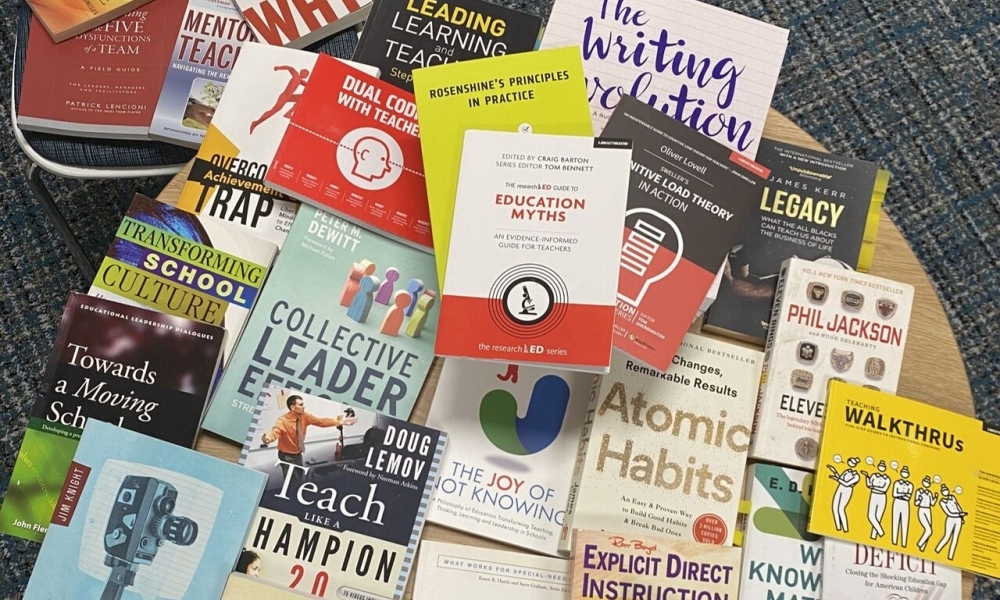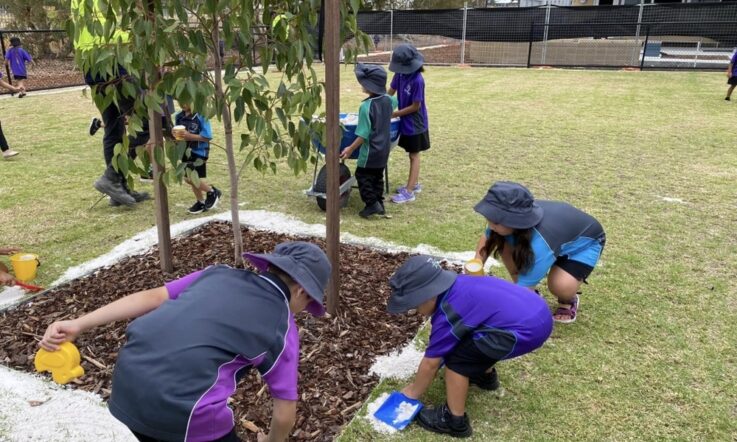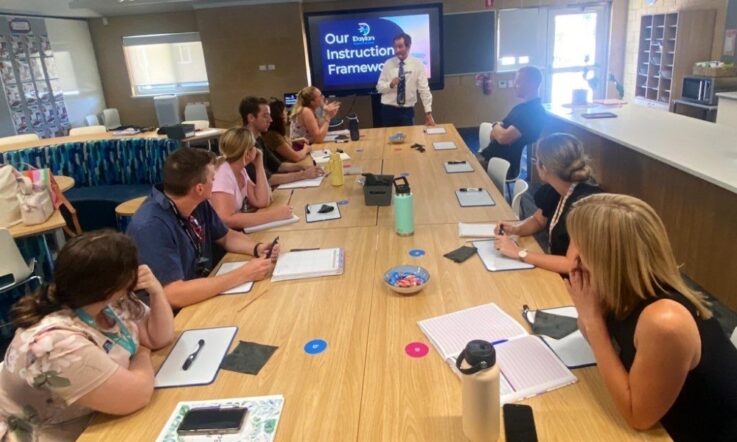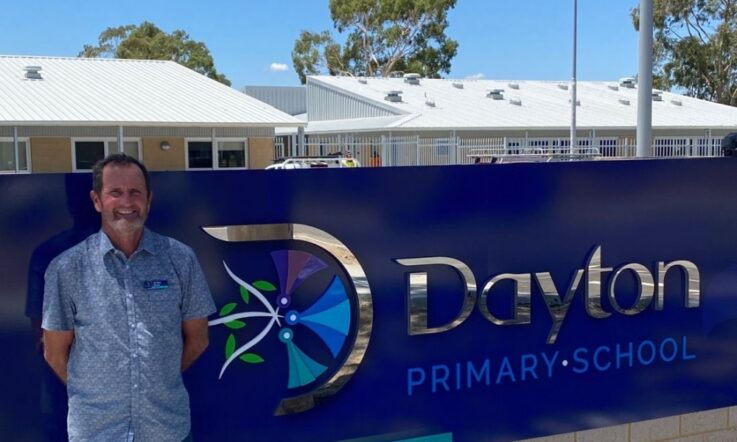This podcast from Teacher is supported by Bank First – the bank built by teachers for teachers.
Thanks for downloading this podcast from Teacher – I’m Jo Earp. School Assembly is the podcast that explores what it takes to build a new school from the ground up. In Series 1 we’re following Principal Dr Ray Boyd and Associate Principal Rachael Lehr as they navigate the exciting and challenging journey. Each month, we touch base for updates and reflections on their progress in the newly developing suburb of Dayton, located in the eastern metropolitan city of Swan in Perth, Western Australia.
It's been a big start to the month for the team with the official opening of the school. Congratulations to everyone involved on that massive milestone for the community. Our focus for this episode of School Assembly is educational research and reading, and how this evidence base is the foundation for everything that’s happening at the school, from classroom teaching to leadership. A heads-up on terminology – when talking about keeping up to date with research, Ray mentions WAPPA (that’s the Western Australian Primary Principals' Association) and ACEL (that’s the Australian Council for Educational Leaders). Okay, enjoy the episode!
Jo Earp: So I want to talk about educational research and reading in this episode, and it's clear in the communications that you've got with the wider education community through social media (you’re very active on LinkedIn, for example) and the previous episodes that we've done in this podcast, you really push the importance of evidence-based practice.
Ray Boyd: Yeah, we do. The important aspect that I often overlook though, is when I talk about best practice it's in relation to current research, so obviously that means it's changing all the time, Jo. So, if we're working off what they're saying is great practice in a classroom at the moment, and then something changes about that and it's significant and the research around that is very significant, then obviously we'll start to alter it and look at it around that. But, if you look at the research that says ‘this is the way we work with kids’, ‘this is the best results …’ that sort of makes an obvious pathway to follow.
JE: Because we know that there are, you know, certain things that do help towards improving student outcomes. And, like you say, the methods of achieving that may be changing all the time, but we know that certain things do help. So, does that research base then, does that permeate across all aspects of the work and what's happening at Dayton Primary in terms of building the new school?
Rachael Lehr: It certainly has Jo. Obviously in relation to teaching and learning – so instructional research, we've looked into that – but it actually goes through into our leadership and how we're leading the school, how we're doing coaching with our staff, we're looking at work around behaviour and trauma and wellbeing, and everything like that. So, it's threading through everything we do at the school. We're looking at the science of reading, the science of learning, cognitive load theory, in our daily reviews. So, there's a research behind everything that we're doing and implementing.
RB: There's nothing that we've got in the school, or brought into the school, that doesn't have some sort of research, either current or historical research (unless of course, it's been contradicted). On a simple level, Rosenshine’s work that we draw on – now that drew on 3 pieces of research: cognitive science; classroom practices; and research that essentially helps students learn complex tasks. Now the interesting part about that is none of that research, none of the research or findings that Rosenshine came up with were actually contradicted.
So, that still sits there in a huge way across what we do. And you'll probably find that’s very evident in a lot of schools, not just Dayton (or certainly something we did at West Beechboro, our previous school). And we've looked really closely, particularly around our leadership stuff, which Rachael just touched on there, around Peter DeWitt's work and James Nottingham's work around collective leader efficacy and establishing a vision and working backwards from that.
JE: Yeah, of course one of the difficult things is it takes a long time, doesn't it, for research to make it into practice. But, I guess that's a whole new conversation. You … I don't know how to phrase this Ray, you've been around in education for a few years now. How has your view of educational research and the importance of that in your day-to-day practice developed through your career? I mean, I was thinking maybe it's always been an important thing to you but was there a particular point in your career where it really sort of became more of a focus or maybe somebody worked with that had a particular influence on you?
RB: Yeah, I don't think it's so much that my view changed, rather I became aware of it – and that was through working as a deputy principal with Dr Neil McNeil. That was back in 2001 when I was over at Ellenbrook Primary School as a deputy, and he gave me my first book that I'd read … actually, it was the first educational book I’d ever read since I left university in 1988. So, it was his pushing and his urging and his encouragement that got me into the research. And then it was just sort of a natural flow on. It probably accelerated more once I got into my Masters, because obviously you're doing a lot more reading, and then the Doctorate level took it to a whole new level. But it was certainly more a case, for me anyway, of actually becoming aware of what the research was and the importance of it. And it's part of the reason, and a big part of the reason, I constantly expose my staff to it, because I think it's actually an important element of our profession.
RL: And that ties into when I became aware of evidence-based practice, and that was when I actually joined West Beechboro Primary School, where Ray was the Principal. Because coming out of uni, these things weren't even on our radar, there was a lot of whole language and we didn't learn about the science of learning, any of those things. So being lucky enough to get a job at West Beechboro, then Ray brought that to the staff. We watched this video Waiting for Superman, and it was, you know, talking about effective practice in American schools. But, yeah, so I was just lucky that I came across West Beechboro and a place where evidence-based practice was at the fore there. So, I could have been on a very different journey if my first job was in a different school.
RB: And the other thing too, Jo, there's a bit of a flow-on effect – once you start doing reading and then engaging in conversations you sort of create opportunities to meet people. Along the way we've connected with Lorraine Hammond, we’ve connected with John Fleming over in the eastern states, James Nottingham, Peter DeWitt. I got a chance to go to Harvard as part of the [studies] and fellowship for principals with the Department of Education, so then you speak to people like Gardner. So, there's actually a bit … the more you read, the more opportunities seem to open up and the connections you start to make, which again create a bit of a snowball effect around looking at research.
JE: You’re listening to Episode 9 of the School Assembly podcast from Teacher magazine. We’ll be back after this quick message from our sponsor.
Busy living life to the fullest? With Bank First's term deposit, you can make your money work even harder while you keep on doing the things you love. Visit bankfirst.com.au to find out more about our amazing term deposit offers. Bank First. Caring for those who care for the community is just what we do. Bank First is the product issuer, AFSL/ ACL 240 960. Terms and Conditions apply, FSG and relevant TMD available online.
JE: In previous episodes then, we've mentioned quite a few examples of research work and leadership or motivational books; Legacy, we've mentioned that a couple of times, for example, that's James Kerr. That's actually about the New Zealand All Blacks, isn't it, the rugby team. And, for people listening who this is the first episode, we go through quite a few in Episode 8 if you want to catch up with that. So, I don't want to spend too much time naming lots and lots of titles, but do you want to give a shout out to just one, maybe, that's on your bedside table or maybe knocking around on the desk at the moment?
RB: Yeah. Well, one for me at the moment, is De-implementation, by Peter DeWitt. Although Rachel would argue that that's not on my table at the moment and my counter to that is someone's pinched it, so I'm looking for it again. But that's the one for me at the moment.
RL: And I was talking to Ray yesterday talking about the books on my desk at the moment are a couple of kids books – I've got Where the Wild Things Are and Albie [and the] Space Rocket – because I'm lucky enough to be getting back into the classroom, doing some teaching. So, I'm planning some units around that. But, as far as education, The Writing Revolution is a book that's been on my desk for a while now because (we'll talk about that later) we've been doing our book study on that. So that's right at the front of my reading list, and I'm just carrying a little bag of books around behaviour as I'm writing some behaviour and engagement policies as well.
JE: So there's always things there for you to refer to. And De-implementation, Ray, that's about doing the things that do work and stopping the things that don't work, yeah?
RB: Yeah. It’s essentially about decluttering. It ties in beautifully with James Nottingham’s stuff and, again, coming back to your earlier questions around research, this is where you start to do reading and you make those connections. So, James is all about, his work is about creating a school vision and making sure everything aligns to that. And then Peter’s work’s about ‘well, don't do stuff if it's pulling energy away from other things’, so it syncs in with alignment as well. But it's just, for Dayton, it's important because if we get it right we don't have to do de-implementation. Whereas, when I was at West Beechboro there were things we had to change – so there were things we had to actually take out of what we were doing. So, depending on where you are in your journey, the book can go either way for you.
JE: Yeah. And then alongside the books of course there are research papers, lots of journals out there, research-based publications – like Teacher, of course! How do you keep up to date with what's out there? Is that through sort of your PD, your recommendations? Does it start with an issue – you mentioned there, Rachael, about behaviour, you’re writing a policy at the moment. So, does it start with an issue and then you sort of search from there?
RL: For me, most of the things that I come across are through social media. So I'll come across things on Twitter, got a lot of connections on there. LinkedIn. I've been listening to podcasts. So, Ollie Lovell’s podcast is based on a lot of different authors’ work. So, yeah, through connections on social media. And I'm also doing my Doctorate in early childhood digital tech use, so I come across a lot of articles in my research for that. And Ray also shares a lot of things with us through our weekly staff newsletter – The Drumbeat – so, lots of articles coming to our attention.
RB: Yeah, mine’s not too dissimilar actually, Jo. Twitter, LinkedIn. I subscribe to a number of publications; I’m a member of WAPPA (Western Australian Primary Principals' Association) and ACEL (Australian Council for Educational Leaders), so we get stuff that way, actively hunt for work and for articles. One of the things you see on Twitter sometimes is studies people put out or link you to, but they tend to be more of a perspective study, so a way people feel. [inaudible]… that's great, let's see if we can actually find something where there's some data beyond a person saying this actually looks like it works, actually going and finding something where they've looked at data – whether that’s student achievement – and you can see a shift in terms of what that research is suggesting.
JE: And the other big thing which we often hear from teachers obviously is about the time pressures of that. When do you find the time to do that personal reading, or you know work-related reading – I'm calling it personal reading, but it’s for your work. Do you build that into your week? Is that something you do on the commute? Or, you know, when do you do it?
RL: Well, I walk in the mornings and it's been very cold and dark lately, but listening to podcasts then, so that's one way to get it in. And obviously on the drive, which isn't very long. But, I'll sit with my morning coffee and I'll read; and sometimes on the weekend with a wine. During the holidays, I'll switch to fiction and novels, but during the term my reading is all around education. So, plenty of time really.
RB: And I just make time. As I often say, there's only so many hours in a day, and that's why we invented lights. But I'm a bit of a night owl, so I'll read at night. Whenever I can, really. It's not a matter of finding time, it’s just, sort of, I create time around it.
JE: I mean, I suppose there’s the argument isn't there that by embedding these kinds of interventions and looking at the research, you’re saving yourself time in the long run anyway, aren’t you? Hopefully.
RB: Yeah. And like Rachel, in my case, I try to switch to novels during the holiday break, so I actually get a brain switch. But that's hard after doing a Masters and then flowing into a Doctorate. So that's, what? 12? No, 10 years of study where I think my first holiday I went away this year, where I haven't actually read something educational. You create a bit of a habit around that.
JE: Now, Rachel, in the last episode your proudest achievement was the Book Club for staff. And it was a voluntary thing, wasn't it? And everyone turned up, which is brilliant! So, take us through how you’re running that at Dayton, is that going to be a regular fixture then?
RL: Yes, so we've actually had another book club since we spoke – so, every second week. So, we have staff meetings on Thursdays on even weeks of the term; so every opposite week we're offering the opportunity for everyone to come. And so, again, we had all of our classroom teaching staff there last Thursday, which was awesome. So, lots of really rich discussions around the chapter and then also I created some activities which actually were increasing our knowledge. Because, what we've discovered is that the way we were taught around writing instruction (or we weren't taught), there's a lot that we don't actually know. So, it's been great to actually, as a collective, have the whole staff together working around increasing our knowledge and helping us to know how to really teach the kids well in writing. We will have a few more to go, we're only up to Chapter One! So, we'll just work through it one chapter at a time.
JE: Excellent, well good luck with that book club then for the rest of the year. Before we go then, let's do our reflection of what's happened since the last episode. So proudest achievement, biggest hurdle and key learning for both of you.
RB: For me, our official opening and getting full access to the school was the proudest achievement. The biggest hurdle continues to be our furniture sagas and the key learning for me was the importance of being in rooms and continually providing feedback to our team, and acknowledging; acknowledgement is probably the biggest driver to increase commitment.
RL: And my proudest achievement was the same as Ray, is just on Monday morning, sitting in our undercover area, seeing our whole staff and student and family members gathered there for the first time. It was just a really proud moment and there was a lot of work to get to that point. Biggest hurdle was the start of this term, taking over the whole of the school and having to shift classrooms was quite triggering, in that it felt like the start of the year again – furniture issues, as Ray mentioned. So that was a little bit overwhelming. And the key learning is I think you sometimes forget that at your heart you're a teacher. So, the opportunity to get into the classrooms again and actually teach my own class, rather than modelling or coaching others, has reminded me that I actually really just love teaching. So that's been a key learning.
JE: That's a lovely way to end on, thank you very much. Well, it's nearly ‘tens-es’ here in Melbourne, so my banana bread is calling. It's nearly time for you to get cracking on the school day there in WA. Have a wonderful week, have a wonderful rest of the month, we'll catch up again next month.
RB: Thanks, Jo.
RL: Thanks, Jo, take care.
JE: Bye.
That’s all for this episode – if you want to keep listening and you’ve only just found the School Assembly podcast remember there are another 8 episodes in the archive to catch up on, and there are almost 300 more from Teacher’s other podcast series’, including School Improvement and Teaching Methods. Before you go, I have a favour to ask – please take just a few moments to rate and review our podcast. It helps more people like you to find our podcast, and it’s a really big support for the team. So, thanks.
You've been listening to a podcast from Teacher supported by Bank First – the bank built by teachers for teachers.
Other episodes in this series:
How do you keep up to date with the latest educational research and work-related reading and listening? Do you allocate a set time in your week? Do you share relevant materials with colleagues? How does educational research feed into your own classroom or leadership practice?



